Why the MLM industry is dying out (and why that’s good news for us all)
Could multi-level marketing be dying out? Find out why the signs indicate that the MLM industry is in a terminal decline – and why we should all celebrate.
Despite a brief surge in popularity during the pandemic (thanks to the cynical and desperate recruiting by companies and reps), the evidence shows that the MLM industry is, in fact, slowly dying out.
An article by William Keep, former Dean, School of Business and former Interim Provost/VP for Academic Affairs, and Professor of Marketing at The College of New Jersey, compares data from the Direct Marketing Association (DSA) with all retail sales in the USA.
‘The MLM industry is at its lowest mark since 1992’
And the news isn’t good for the multi-level marketing (MLM) industry. This chart (taken from William Keep’s article) shows direct selling (MLM) sales as a percentage of all US retail sales:
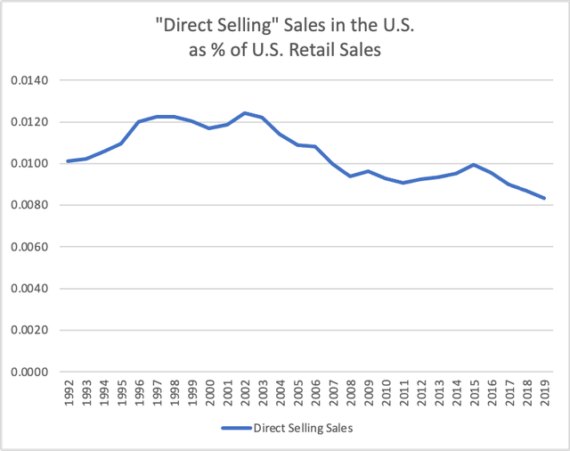
As you can see, since 2002, the proportion of MLM sales have been in an almost consistent decline. And from examining the latest data available, William Keep discovered that MLM industry retail sales represent just .84% of US Retail Sales – putting the industry at its lowest mark since 1992.
This news doesn’t surprise us. We know that 99.6% of all participants in an MLM, on average, will lose money once expenses are taken into account. And we’ve already reported on the signs that it’s (thankfully) an industry in decline.
MLM reps earned LESS in 2019 than in 2004
In another article by William Keep on Seeking Alpha he reveals how, shockingly, MLM reps in the US in 2019 earned LESS than they did in 2004. This is based on data from the DSA themselves:
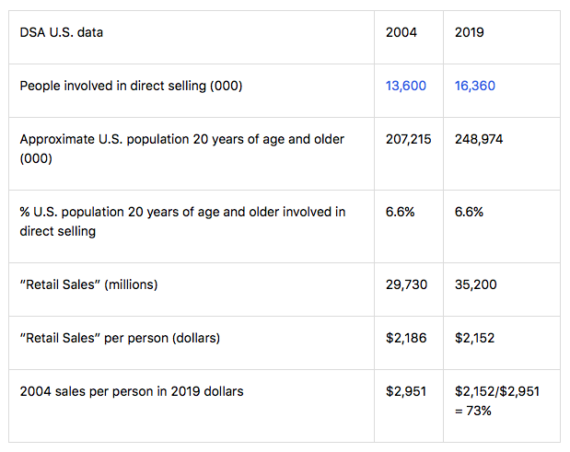
He also points out that one of the oldest MLM companies, Amway, has announced layoffs totaling over 1,100 employees over the past three years.
Here’s another interesting article by William Keep on Seeking Apha. This article investigates the declining gross margins and operating margins of well-known network marketing companies.
MLM has even less of the retail market in the UK
MLM has even less share of the UK retail market. According to the DSA, the direct selling industry contributes £2.7 billion a year to the UK economy. And the total value of all UK retail sales last year was £394 billion.
This means that the MLM industry is worth just .67% of the entire retail industry – lower even than the USA.
What exactly do the DSA do? Do they have any purpose beyond just promoting the agenda of their members? Find out what we think here.
MLM’s dirty secrets are finally being aired
One reason why MLMs are gradually dying out could be because there’s increased exposure of the dark side of the industry.
The first series of The Dream podcast revealed the shady side of MLM, and the real reason why the industry isn’t illegal. And global MLM expert Robert Fitzpatrick has gone further by telling the story of multi-level marketing in his excellent new book Ponzinomics.
The media has also caught onto the scam that the industry really is – in our and many experts’ opinions. Documentaries like Betting on Zero, the BBC’s Secrets of the Multi-Level Millionaires, and critical mainstream media coverage, like this article in YOU Magazine, have helped spread awareness to millions of people around the world.
And appearances like this one on the BBC’s Women’s Hour by the DSA’s Director General, in which she ignored any factual points put to her and just trotted out tired, old MLM cliches and lies, just help prove that it’s not a reputable industry.
There’s been an explosion of anti-MLM YouTubers appear over the past year too, many of them former MLM reps. They are eager to air the dirty laundry of the companies they joined, the MLM industry as a whole, and the cynical sharks who feed off it by selling coaching and products to desperate reps (often shilled with a blatant stream of provable lies).
There are a growing number of popular Facebook groups, such as MLM Lies Exposed, dedicated to spreading the word about MLMs and offering support for its many victims. The largest, Sounds Like MLM But Okay, has 142,000 members. The antiMLM Reddit, meanwhile, has over 500k recruits.
Pyramid-shaped scams that rely on the same false recruitment maths as MLMs, like the Secret Sister gift exchange, are also being exposed on social media and in the press.
With so much mainstream exposure of the truth behind the industry, it seems inconceivable that it can pull itself out of the clear decline it’s now in.
The FTC is cracking down on illegal pyramid schemes
To make matters worse for MLM companies, in the US there are welcome indications that the FTC is increasingly cracking down on the industry:
- In 2016 the (FTC) fined MLM Herbalife $200 million, saying that their compensation structure was unfair because it “rewards distributors for recruiting others to join and purchase products in order to advance in the marketing program, rather than in response to actual retail demand for the product”.
- Earlier this year they went one step further, fining another MLM, Advocare, $150 million (and fining two of their top reps) and banning the company from operating a network marketing business. They also labelled Advocare a “pyramid scheme” and a “scam”.
- The FTC have also announced they’re suing MLM Nerium, alleging the company “operates as an illegal pyramid scheme and falsely promises recruits they will achieve financial independence if they join the scheme”.
- Earlier this year the FTC sent 16 MLM companies warning letters about coronavirus fraud.
- The FTC, along with 19 federal, state, and local law enforcement partners, has also announced a nationwide crackdown on scams that target consumers with fake promises of income and financial independence that have no basis in reality.
In the latter press release, the FTC shares this visual on how to spot an income scam:

We’ve seen all bar one of these claims on numerous MLM recruitment social media posts, including some here – proving that in the eyes of the law, these are income scams.
And as William Keep told Forbes:
“The more the FTC successfully demonstrates the ability to prosecute a firm for a pyramid scheme in this industry, the higher the probability that the next firm could be prosecuted. Because they all fundamentally use the same model.”
One MLM industry expert even cites the FTC cracking down as the reason why network marketing companies can no longer spend “99% of their attention” on selling to their own representatives, rather than genuine retail customers.
‘The direct selling industry is in decline’
Truth in Advertising (TINA) also published an article claiming that the direct selling industry is in decline. The article points out that the number of companies leaving the Direct Selling Association (DSA) is outpacing the number joining it.
They further observe that cases against MLMs are beginning to stack up. Between 2008 and 2018, the FTC pursued four cases alleging MLMs were pyramid schemes (and as we’ve read above, they’ve since launched more). And between 2017 and 2018, 24 federal class actions were filed against MLMs alleging they were pyramid schemes (seven of these companies were DSA members.)
Over the past three years, a 15% decline in sales volumes averaged by MLM reps has been reported, too. And we’re seeing the fortunes of some long-standing MLMs take a dive. Forever Living UK’s accounts showed a 30% drop in new business in 2018, compared to 2017. And that’s on top of a drop of 64% in 2017 compared to 2016.
In August 2019, Coty announced they were ending their relationship with MLM Younique after just two years, and planned to sell their stake back to the founders again.
And Beachbody reported a 17% decrease in its revenue for Q3 in 2021. At the time of writing the share price for Beachbody was just $1.405. A dramatic drop from just 18 months ago, when its share price was $11.24:

Social media platform TikTok has banned MLMs
But probably the most exciting news recently is the announcement that social media platform TikTok has banned MLMs.
Under the heading ‘Frauds and scams’, TikTok’s new guidelines explicitly state:
“We do not permit anyone to exploit our platform to take advantage of the trust of users and bring about financial or personal harm. We remove content that deceives people in order to gain an unlawful financial or personal advantage, including schemes to defraud individuals or steal assets.”
They then list what this covers, including, “Content that depicts or promotes Ponzi, multi-level marketing, or pyramid schemes.”
Here’s the excerpt:
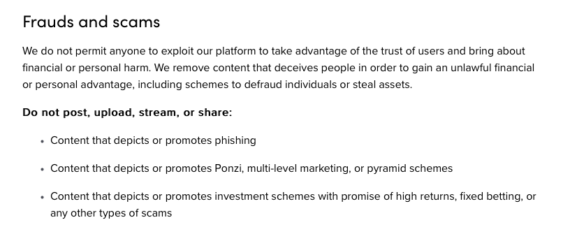
This is important for several reasons. It will hopefully protect more people from falling prey to MLMs. But also, a global business has come out and declared multi-level marketing as a ‘fraud’ or ‘scam’.
This declaration groups MLMs with ponzi and pyramid schemes. Hardly an admirable group to be part of, but a fitting one in our opinion! TikTok also clearly believes that multi-level marketing takes “advantage of the trust of users and bring[s] about financial or personal harm.”
This is an important step in raising more awareness of the harm that multi-level marketing schemes cause, and is hopefully yet another nail in the industry’s coffin. Wouldn’t it be wonderful if Facebook, Twitter, Instagram and LinkedIn followed suit?
Network marketing consulting firm admits ‘99% of attention was on selling to reps’
Further evidence that old MLM practices are no longer working for them comes from the January newsletter of the network marketing consulting firm Sylvina Consulting:
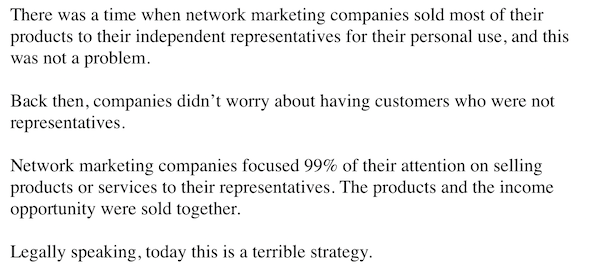
As you can read in the screenshot above, they reveal that:
“There was a time when network marketing companies sold most of their products to their independent representatives for their personal use, and this was not a problem.
“Back then, companies didn’t worry about having customers who were not representatives.
“Network marketing companies focused 99% of their attention on selling products or services to their representatives. The products and the income opportunity were sold together.
“Legally speaking, today this is a terrible strategy.”
They admit that this is a terrible strategy today, for legal reasons (and was always a morally dubious strategy, in our opinion).
And yet we know that most of the sales MLMs make (and this email confirms it) aren’t to the general public. If they are now having to switch their strategy, then this explains why their sales seem to be down, and so many MLMs appear to be struggling.
In the blog that is linked to from this email, they elaborate further:
“For many years, this was a good strategy because it accomplished what matters most to companies – more representatives and more sales!
“The U.S. Direct Selling Association lobbied hard to include in their definition of “ultimate consumer purchases” the purchases by independent representatives for personal use in reasonable quantities. While a valiant effort, this strategy was ultimately unsuccessful in satisfying the Federal Trade Commission (FTC).”
They confess that the end goal was never to sell to actual, real customers. And that the Direct Selling Association (DSA) had lobbied the Federal Trade Commission (FTC) to allow personal purchases to count as ‘customer sales’ – and failed.
MLM LuLaRoe pays $4.75 million to settle lawsuit that accused it of being a “pyramid scheme”
To add to their woes, there are a number of lawsuits currently in process against a number of MLMs, including MONAT and LuLaRoe.
On 2 February 2021, Washington State Attorney General announced that LuLaRoe had paid $4.75 million to settle their lawsuit against the company, accusing it of being a “pyramid scheme”.
You can read their announcement in full in the link above. But here are some excerpts:
- “LuLaRoe tricked Washingtonians into buying into its pyramid scheme with deceptive claims and false promises… As a result, thousands lost money and two individuals made millions from their scheme. Washingtonians deserve fairness and honesty — and accountability for those who don’t play by the rules.”
- “LuLaRoe made several misleading claims regarding the profitability of its business model to encourage more consumers to become retailers. For example, LuLaRoe advertised that retailers could make “full-time income” for “part-time work.””
- “LuLaRoe’s structure ensured that the highest-ranking retailers would earn income by recruiting retailers in the lower categories. This allowed two LuLaRoe retailers — who each had hundreds of recruits in their “downlines” — to make more than $5 million in profit collectively between 2016 and 2019, while at the same time, more than a third of retailers reported losses.”
- “Under the terms of the resolution, LuLaRoe must pay $4.75 million to the Attorney General’s Office. Ferguson will use $4 million of this payment to provide restitution to LuLaRoe retailers from Washington.”
Many MLMs are struggling post-pandemic
While the pandemic may have offered MLMs a slight reprieve, the picture post-Covid doesn’t look bright for them. According to Bloomberg, “Supplement maker Juice Plus+ Co.’s revenue and earnings are sinking as the multi-level marketing company struggles to attract and retain distributors to sell its products.”
Bloomberg reports that the company’s revenue dropped around 20% in the nine months through January compared with a year earlier, and the company’s performance is expected to continue to decline as pandemic restrictions ease further, and traditional employment opportunities open up again.
The report continues to note that Juice Plus+’s financial metrics are expected to be at “levels we deem unsustainable for its capital structure” in the 2023 fiscal year.
Things don’t look any rosier for MLM Rodan & Fields. According to Bloomberg, the company is “facing stressed liquidity after the company reached an agreement to settle class-action lawsuits over one of its
products.”
The company has apparently agreed to pay $30 million in a cash fund and provide $8 million in product
vouchers for costumers who sued.. They alleged that Rodan & Fields’s Lash Boost eyelash growth serum had harmful side effects which ranged from eye irritation to darkening of the eyelid and excessive tearing.
The company has also apparently said it expects revenue to “decline 10% this year, following a 20% drop in 2021.”
2021 was also a difficult year for MLM Forever Living in the UK. Their latest accounts, published in May 2022, state that their sales decreased by 11% that year, and that “Legislation continues to be of some risk to the Company, in particular the Nutrition and Health Claims Regulations.”
Personally we find that last statement quite odd. If Forever Living’s products work as claimed, and their distributors are properly trained and behaving ethically, surely they would have nothing to fear from legislation?
It wasn’t just 2021 that was a bad year for Forever Living. The company appears to have gradually shrunk since its golden years of 2015 and 2016. Here’s its annual turnover over the past 16 years, according to their published accounts:
- 2007: £22,082,569
- 2008: £22,682,489
- 2009: £23,412,358
- 2010: £24,157,199
- 2011: £23,878,750
- 2012 £27,167,812
- 2013: £34,726,349
- 2014: £58,993,590
- 2015: £106,489,238
- 2016 £80,066,133
- 2017: £42,553,600
- 2018: £32,193,744
- 2019: £24,510,601
- 2020: £27,466,360
- 2021: £24,139,971
- 2022: £19,643,954
As you can see, their 2022 turnover is its lowest for over 16 years! And with greater awareness of the reality of MLMs today, and with a general apparent decline in the industry as a whole, we can’t see Forever Living returning to the giddy heights of 2015 again.
Find out why so many of the UK’s top Forever Living managers are struggling, and discover the huge debts they appear unable to repay here.
You can also read our review of Forever Living UK and the worrying state of their finances and top distributors.
Forever Living has to RENT out its headquarters to other businesses
If you’re looking for further evidence that Forever Living is in a sharp decline in the UK, look no further than their glamorous UK headquarters, Longbridge Manor. In the past, Forever Living has hosted training, meetings and events in the manor house. But in the past couple of years they have switched to a tent on their lawn – even in winter.
So what’s happening with the house? According to this news article, Forever Living are ‘generously’ allowing local businesses and community groups to rent its training and meetings rooms.
A company representative was quoted saying: “It can be difficult for smaller businesses to find affordable meetings and training facilities in the area. We have a fully equipped training room that can hold up to 100 and a meeting room that can host up to 30, with parking on-site and catering facilities.”
Given that Forever Living were never apparently this magnanimous when the cash was rolling in, we suspect it has less to do with supporting local businesses and more about raising much-needed cash.
MLMs’ economic contribution in the UK has halved
In 2018 we wrote an article examine whether you it was really possible to make money in an MLM. In the article we shared this screenshot from the UK DSA website (if you are curious, you can view older versions of the DSA homepage here):

As you can see, the DSA claim that direct selling makes a £2 billion economic contribution in the UK. Roll on three years, and things clearly weren’t as rosy for the industry. On the DSA website in 2021, their economic contribution had reduced to £1.1 billion:

And the decline has continued. At the time of writing this, in January 2023, the industry’s economic contribution has HALVED from its 2018 high to just £1 billion:

This is despite the approximate number of direct sellers in the UK increasing from 425,000 in 2018 to 631,000 in 2021, and dropping to 500,000 today. Which means there is even less money to go round more people.
doTERRA has lost 41% of its wellness advocates in two years
Further evidence that opportunities for the MLM industry are shrinking appears to lie in essential oil MLM doTERRA’s 2019 income disclosure statement. In the statement, the company reveals that it had 530,651 Wellness Advocates in 2019 (267,194 of whom made no money despite incurring business expenses).
However, in 2017, just two years earlier, doTERRA claimed to have 900,000 Wellness Advocates. To us this looks like a devastating 41% loss for the MLM.
Usborne Books & More rebrands as PaperPie after losing 41% of its sales consultants
As we report in this investigation into Usborne Books & More, the company has recently rebranded as PaperPie after seemingly suffering significant losses.
The MLM company is a division of Educational Development Corporation (EDC) and according to news reports, their earnings have taken a significant dive in the past year:
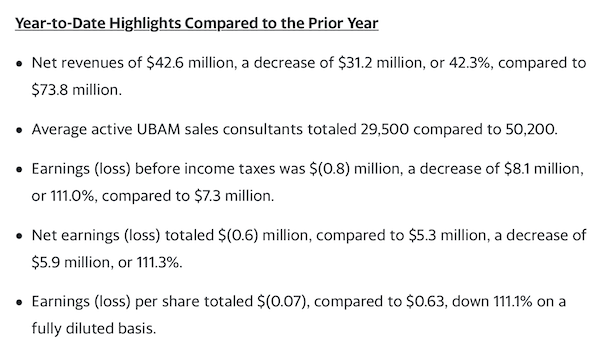
These year to date highlights for 2022 reveal that Usborne Books & More have lost 20,700 sales consultants – a huge 41% of all their sales consultants.
EDC’s earnings have also apparently taken a dramatic dive. Their net revenues are 42.3% lower, and their earnings before tax are down 111% – to the extent that they appear to have made a loss.
Was the rebrand of Usborne Books & More to PaperPie merely an attempt to turn around a failing business?
The Body Shop at Home closes in the US
Hot on the heels of the Usborne Books & More rebrand comes the news that The Body Shop at Home (TBSAH) has closed in the US:
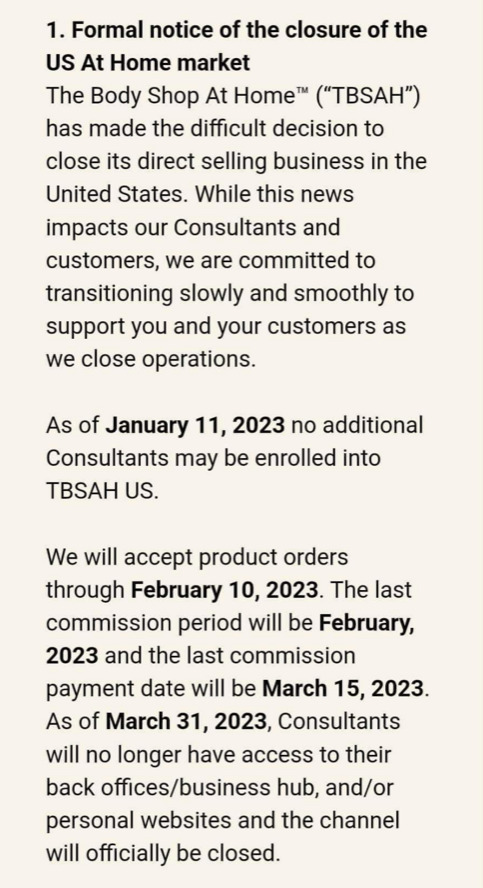
When considered in light of the news that doTERRA and Usborne Books & More both appear to have lost a considerable amount of sales consultants, it is a clear indication that things are tough right now for MLMs – and (we hope) will only get harder.
The Body Shop at Home only re-started their direct selling arm in the US in spring 2020, to ‘help’ people impacted by the coronavirus outbreak. At the time, Peter Kropp, global director of the Body Shop at Home said: “Direct selling has increased in importance as a result of the current coronavirus pandemic.”
Obviously, the poor success rate of people who join MLMs, plus growing awareness of the problematic business model, meant that the Body Shop at Home didn’t fare as well as they had hoped.
This was the Body Shop at Home’s second attempt to conquer the US with its direct selling business model. They previously closed this side of the business in 2008.
Initially, the company appeared to be doing well: “Through marketing the program on its site and via email to customers, the program has grown to over 6,000 representatives in the U.S. in about 90 days.” However, clearly this initial growth was not sustained.
The Body Shop at Home closes its UK distribution centre
It’s not just the US Body Shop at Home that is struggling. In May 2022, it was reported that the direct selling side of the business in the UK was “seeing a steep decline in consultant numbers as economies reopen.”
In January 2023 the company announced it was closing its direct selling distribution centre in Corby, UK, impacting 28 permanent staff and 35 agency workers.
According to the Northamptonshire Telegraph, “During the pandemic lockdowns, multi-level marketing companies experienced a short-lived boom that meant the BSAH needed extra capacity to send out products to its distributors. It opened its new operation in Corby two years ago, but since then, demand has dropped.”
Maybe we’ll ultimately see the UK Body Shop at Home close too?
Cambridge Weight Plan announces redundancies
Sadly for workers in Corby, the Body Shop at Home isn’t the only MLM talking about redundancies. Cambridge Weight Plan, a weight loss MLM, also announced in January 2023 that they would need to let people go.
The company’s Chris McDermott, said: “Following challenging trading conditions, the business has been forced to review its current operations and infrastructure with a view to driving efficiencies.”
The company’s most recent accounts noted that the past 12 months had been some of the ‘most challenging’ the business had faced in the past 20 years. The company listed Covid, the war in Ukraine and the cost-of-living crisis as potential reasons for this.
But given the general trend in the network marketing industry, we believe a move away from the MLM model by consumers could have had an impact too.
Tupperware warns it may go out of business
In a press release in April 2023, Tupperware announced that the company has “substantial doubt about its ability to continue as a going concern.”
The company also faces being delisted from the New York Stock Exchange due to late filing of its annual report, known as a 10-K. Tupperware also warned that when the company does file its financial results, they will look substantially worse than the company initially reported.
Avon start selling on the high street
In yet another encouraging sign that the MLM business model is dead, Avon have started selling products through high street store Superdrug. The company claims it will help them to “embrace a wider customer base” – code for (we suspect) ‘we aren’t selling enough through our reps any more’.
What this will do to their network marketing business model remains to be seen. But we can’t see their reps being happy at competing with Superdrug for sales.
Avon like to claim they are “a beloved and widely recognisable brand”, but the truth, as far as we have investigated here, appears a little darker. They also have a history of seemingly treating their people poorly.
Rodan + Fields ‘abandon the multi-level direct selling model’
Another sign the MLM model no longer works is the news that Rodan + Fields are adopting a new business model, “which will be supported by a broader array of marketing and advertising across traditional channels and social media”.
In addition to laying off approximately 100 staff, Rodan + Fields (R+F) is switching from an MLM model to an affiliate scheme which will only be available for existing R+F Consultants. Under the new scheme, R+F Consultants will receive increased commissions on customer sales and product discounts. However the model will not include recruitment and commissions from a downline.
If this isn’t a sign that the MLM business model is no longer sustainable, we don’t know what is!
Why it is GOOD that MLMs are in decline
We’re delighted that the MLM industry appears to be in a (hopefully terminal) decline. As Time Magazine points out:
“MLMs are not illegal, but many are at best financially risky. The chances of financial success are so grim that the DSA president, Mariano, has called participating in MLMs an “activity” rather than a job.”
And our investigations into several MLM companies back that up:
- Herbalife
- Arbonne
- Stella&Dot
- Younique
- MONAT
- Isagenix
- Nu Skin
- doTERRA
- Acti-Labs
- LuLaRoe
- Amway
- Usborne Books
- It Works
- Forever Living Products
- Juice Plus
Time Magazine highlights these statistics too:
- At Young Living, 89% of US-based distributors earned an average of $4 in 2018, according to an income-disclosure statement.
- At the skin-care MLM Rodan + Fields, 67.1% of sellers had an annual median income of $227 in 2019.
- More than half the distributors at Color Street fell into the company’s lowest tier of earners in 2018, with average monthly profits below $12.
Time Magazine also notes that consumer complaints about MLMs have risen over the past few years, as have the number of lawsuits against them. Some US states – including Washington, California and Illinois – are even representing plaintiffs in suits against several MLMs.
‘MLM queen’ Rachel Hollis appears to turn against the industry
Even the queen of MLM inspirational talks, Rachel Hollis (who has been accused of plagiarism for years and is finally being sued herself) appears to have turned on the industry who made her in her latest book, Didn’t See That Coming:

Yes, after years of making a fortune from people who did exactly that, she counsels people not to invest in at-home businesses that require you to pay to join: “Don’t be dumb! Figure out ways to make money that don’t require money.”
Talking about biting the hand that feeds you! But if Rachel Hollis, whose entire living appears to be built off being fan-girled by MLM recruits has turned against the industry, then the writing really must be on the wall.
Hopefully fewer victims will be recruited in future
It’s not just the financial loss that causes so much damage when people join an MLM; the emotional price they pay can be devastating.
Like cults and abusive relationships, MLM schemes suck you in with false promises, delusions of a fantasy lifestyle and love bombing. And once you’re in you’re gaslit and manipulated, so you believe that if you aren’t successful (and we already know that the statistics say that 99.6% of people aren’t) then you are told it’s your fault. You don’t want it enough. You’re not trying hard enough. You have a negative attitude.
And when your friends and family – the people who love and care about you – try to let you know you’re changing, or warn you about the business, you’re told they’re ‘jealous’, ‘negative’ and ‘holding you back’. MLM reps have even been encouraged to leave their partner or spouse if they weren’t supportive of the business.
The damage caused by this emotional abuse and isolation is enormous. When we speak to people who have escaped from MLMs, it’s often like a therapy session. It’s usually the first time they have really told anyone about what they experienced. They’re ashamed, frightened and even hiding secrets (including large debt) from their partners.
That’s why every former MLM-rep we have interviewed has insisted on being anonymous. They have all – every single one – been afraid of repercussions from their former teams. And with good reason: some of the stories we have heard about brave people who have publicly spoken out would make a terrifying Hollywood thriller.
You can read the experiences of some of the former MLM reps we have interviewed here:
- Thinking of joining an MLM like It Works? Read this cautionary tale first
- How much can you earn as an It Works distributor? How one woman lost £3,239
- Look into the bad reviews… then run!” One former rep shares her experience with MLM It Works!
- The complete lowdown on MLM Juice Plus+ and how it cost one woman £68 a month
- How much can you earn with MLM Valentus? And how even the company admits that ‘most reps’ lose money
- Why MLMs like Younique apparently don’t even work for the top reps
So if indeed the MLM industry is in decline, it is good news. Not just for all the brave people working hard to expose the industry, but for everyone except the company owners and the people in the top 0.4% who are making money off the misery and debt of everyone underneath them.
The world as a whole will be better off the day that multi-level marketing finally dies.
Photo by Michael Cox




